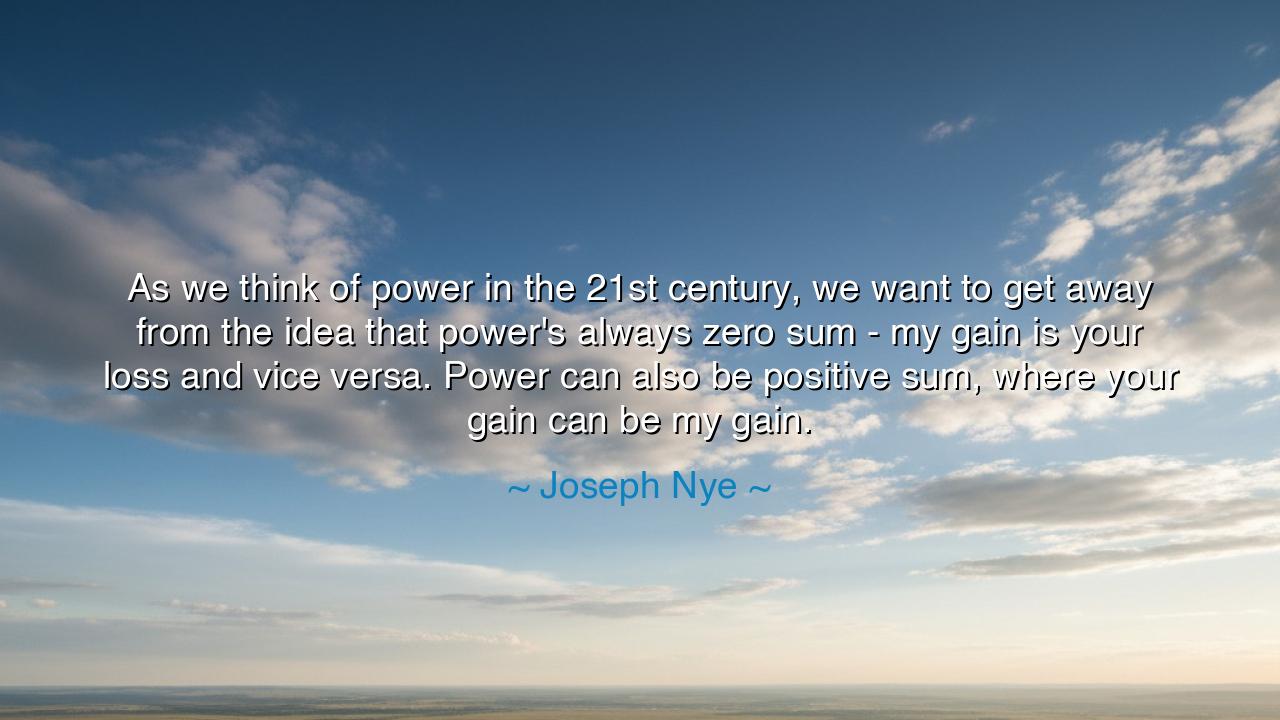
As we think of power in the 21st century, we want to get away
As we think of power in the 21st century, we want to get away from the idea that power's always zero sum - my gain is your loss and vice versa. Power can also be positive sum, where your gain can be my gain.






Hear the wisdom of Joseph Nye, who spoke as one gazing into the heart of nations and the destiny of peoples: “As we think of power in the 21st century, we want to get away from the idea that power’s always zero sum—my gain is your loss and vice versa. Power can also be positive sum, where your gain can be my gain.” These words are not only counsel for rulers but also for all humankind. They urge us to abandon the old belief that strength is forged only in rivalry, that every triumph must be balanced by another’s defeat. Instead, they call us to a higher vision: that power can be shared, multiplied, and made fruitful for all.
For too long, men thought of power as a battlefield where one stands only by making others fall. Kingdoms were built on conquest, empires on subjugation, and rulers boasted of victories that left fields barren and peoples broken. This is the way of the zero sum, where the world is carved like spoils of war and no one’s joy exists without another’s grief. Yet Nye reminds us that there is another path, one where cooperation creates abundance, where one man’s rise does not demand another’s ruin, and where the strength of the many becomes the strength of each.
History bears witness to this truth. Consider the Marshall Plan after the Second World War. Instead of crushing a defeated Europe beneath chains of debt, the United States poured resources into rebuilding its former enemies. The result was not weakness, but mutual flourishing: markets revived, peace strengthened, alliances formed. By treating power as positive sum, the victors and the vanquished alike became partners in prosperity. From that vision was born a new era of stability that endured for generations.
So too in the smaller stage of daily life. Think of the teacher who shares knowledge freely. Her students grow in wisdom, yet her own wisdom is not diminished—it is magnified, reflected in their achievements. This is the very essence of positive-sum power: that by lifting another, we are ourselves lifted higher. True greatness, whether in nations or in individuals, is not to hoard strength, but to multiply it through generosity.
The meaning of Nye’s words is this: the 21st century demands a new kind of thinking. In a world where economies intertwine, where the climate binds us all, where technology bridges every distance, no people can truly rise while another falls. The old law of rivalry must give way to the new law of shared destiny. Your gain can be my gain. Your success can be my success. This is not weakness, but the deepest kind of strength.
The lesson for us, then, is clear: whether in leadership, friendship, or community, choose always to build, not merely to compete. Ask not, “What can I take?” but rather, “What can we create together?” For when we seek positive-sum power, we craft bonds that endure longer than fear and achievements that shine brighter than conquest.
Practical wisdom calls us to three acts. First, when faced with rivalry, seek the path of mutual benefit—look for solutions where all may prosper. Second, when you gain strength, share it, for in sharing it multiplies. Third, remember that the greatest legacy is not domination but cooperation, for the victories of force fade, but the victories of trust endure.
So let it be proclaimed: the age of zero sum must pass away. Let the new age of positive sum arise, where the power of one becomes the power of all. Joseph Nye’s words are a prophecy and a challenge: to leaders, to citizens, to every soul. If we embrace them, we will forge a future where strength is not a chain that binds but a river that nourishes, flowing outward, ever greater, until the whole world is exalted in its current.






BGBui Minh Phuong 1997 Bac Giang
I’m intrigued by this shift in thinking, but I can’t help questioning the underlying assumption that power can be shared without limits. Are there measurable metrics to identify situations where mutual gains are achievable? How do cultural, economic, or political contexts influence whether positive-sum strategies succeed? I’d like to explore how leaders can practically cultivate environments where gains are not just possible for all but sustainable over time.
TTNguyet Thy Thanh
This makes me think about leadership and influence on a personal level. Can adopting a positive-sum mindset in everyday interactions—like at work or in community projects—truly lead to better outcomes for everyone? Or are there risks that some individuals might exploit goodwill for personal advantage? I’m curious about the balance between encouraging cooperative gains and safeguarding against potential abuses in such frameworks.
DHLe Dang Huy
I find this perspective refreshing but also confusing. In situations where resources are limited, can positive-sum outcomes realistically exist, or is some level of competition inevitable? How do we reconcile zero-sum instincts with the possibility of cooperative gains? I’d like insight into strategies for fostering collaboration and trust in systems where historically, people or states have viewed power as strictly competitive.
MXMai Xuan
This idea challenges traditional thinking about competition and influence. I wonder how realistic it is to implement positive-sum approaches in international relations or corporate environments where zero-sum thinking is deeply ingrained. Are there practical examples where nations or organizations have successfully embraced strategies where everyone benefits? I’d like to understand whether this is more of an idealistic vision or if there are proven methods to achieve mutual gains in real-world power dynamics.